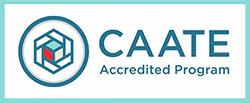
Central to Exercising Your Passion.
Leverage Central's MS in Athletic Training (MSAT) to pursue an exciting career as a Certified Athletic Trainer (ATC). As students in an allied health professional program, you will use clinical experiences to improve the healthcare of individuals in a variety of settings, such as:
- Traditional: Collegiate, high school, professional sports.
- Emerging: Armed forces, occupational, performing arts, health care, physician practice, and public safety.
Recent graduates had a 100% pass rate on the Board of Certification Exam. Additionally, Central Connecticut State University is one of only 153 universities and colleges around the world to be honored by Exercise is Medicine® for its efforts to create a culture of wellness on campus.

Central Connecticut State University’s Athletic Training Professional Program is accredited by the Commission on Accreditation of Athletic Training Education.
Program Features
- Over 50 years of educating students to become Athletic Trainers
- High Fidelity Simulation Training sessions & Joint Training with local EMS
- State-of-the-art Carl Krein Athletic Training Center
- State-of-the-art Biomechanics and Exercise Physiology labs
- Experiential learning with other medical professionals
- Division 1 Intercollegiate sport health care experience
- Dedicated off-campus preceptors in a variety of settings
- Dedicated, nationally recognized instructors who mentor students for success



